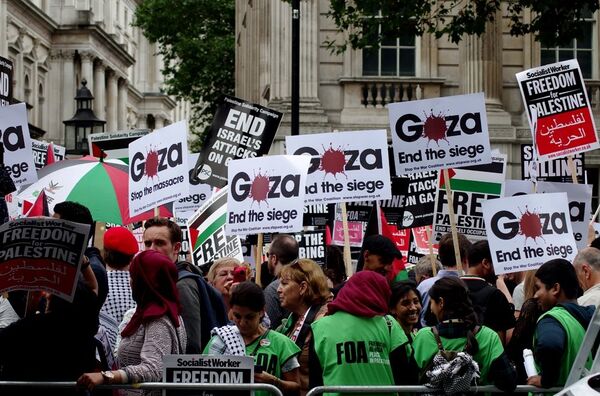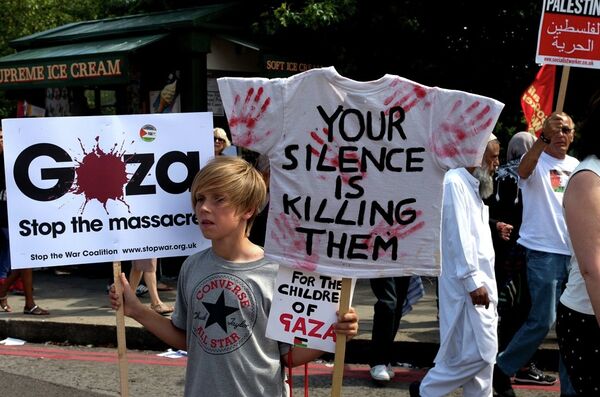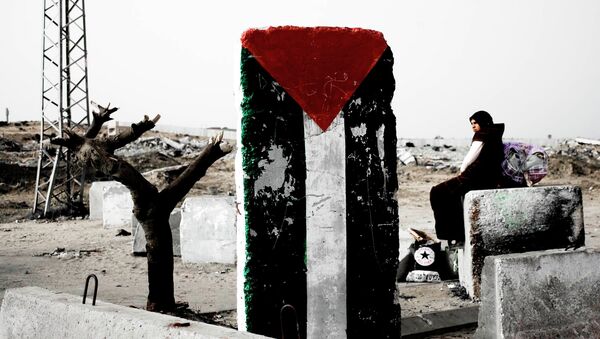B'tselem, Israel's leading human rights organisation, criticised President Benjamin Netanyahu's cabinet, accusing Israeli forces of taking part in a policy of bombing residential buildings during the 2014 summer offensive in Gaza.
#Israel claimed that it acted to prevent harm to civilians in #Gaza. Is that the case? Read our new report #BlackFlag http://t.co/Sb1ciCq9WQ
— B'Tselem בצלם (@btselem) January 28, 2015
The accusations follow an announcement by the International Criminal Court (ICC) that preliminary investigations into possible war crimes in Gaza and the West Bank were being opened.
Last year's conflict has seen relations between Israeli and Palestinian groups reach their lowest levels for many decades, with more than 2,200 people killed, the overwhelming majority of those being Palestinians.
.@btselem report: 70% of #Gaza dead were civilians killed in their homes http://t.co/T9aEXyqWbH pic.twitter.com/4HQVjfyTj4
— JewishVoiceForPeace (@jvplive) January 29, 2015
The conflict has sparked a change in the direction of the Palestinian Authority (PA), who in applying for membership with the ICC, have seemingly turned towards a policy of negotiating with the international community, rather than Israel directly when trying to find a two-state solution.
President Obama reiterates US opposition to Palestinian ICC bid in phone conversation with Israeli PM Netanyahu http://t.co/EJKfuQAvys
— CFoI (@CFoI) January 13, 2015
The decision to apply for ICC membership has been criticised by Israel and the US as being detrimental to negotiations, however Kamel Hawwash, vice chair of the UK-based Palestinian Solidarity Campaign, told Sputnik UK that the decision to turn to the international community was almost forced upon the PA.
"They've tried working bilaterally with the Israelis, but that has gone on for over 22 years. We should by now have had a free, independent state for the Palestinian people. But what has happened instead is that, year after year talks have either restarted or failed, so the Palestinians feel that there's no prospect of reaching an agreement with the Israelis through direct negotiations, and that is the reason for turning to the international community."
Shift in public and political opinion?
Since the Israeli declaration of independence in 1948, Israel has maintained strong relations with the West, particularly with the United States.
However, last year's military operation in Gaza led many to question Israel's approach towards peace, with debates on whether relations between Israel and the West — particularly the United States — were fracturing.
These claims have been compounded by the news that US President Barack Obama won't meet Israeli Prime Minister Benjamin Netanyahu for talks during his tour of the US in March, leading to suggestions that political opinion in America may be turning against Israel.
Meanwhile in the UK, thousands took to the streets across a number of British cities last year to protest against the Israeli offensive in Gaza, with many activists advocating for the British government to step in to try and find a solution to the conflict.
Kamel Hawwash said that the protests were indicative of a significant shift in British public opinion against the action of Israel, and a sign they were becoming more sympathetic to the Palestinian cause.
"If you talked to people who were involved in campaigning for Palestine 25-30 years ago, they'd tell you that you couldn't fill a small room with campaigners, whereas in the summer we saw over 100,000 people marching in the streets of London and many other cities in the UK, and of course internationally."
He also believes that the views of the public influenced British politicians, leading to parliament's decision to recognise Palestine as a state.

The vote, largely seen as a symbolic gesture, hasn't changed the point of view of David Cameron's government on the matter of a two-state solution, which it supports, but only at a "moment of our choosing and when it can best help bring about peace."
Terror group or social movement? Working with Hamas
Conflict between Israeli forces and Palestinian groups have long centred on fighting the Palestinian group Hamas, which has been criticised for being a major obstacle for peace in the region.
Hamas is a Palestinian Islamic movement that was originally formed in the late 1980s as a military and social group which carried out attacks against Israel, while pushing for the rights of Palestinian people.
The group is considered to be a terrorist organisation by Israel, the United States and many other Western countries, while the UK considers Hamas' political arm to be legitimate and it's military factions to be terror groups.
A UK-based pro-Israeli lobby group, the Conservative Friends of Israel, has consistently denounced the actions of Hamas, with a statement from the group which claims that Hamas "facilitates and perpetrates terrorist attacks against Israel."
"Hamas continues to reject the Quartet Principles and have publicly condemned any peace negotiations between Israel and the PA…With its ideology intact, Hamas cannot be a partner for peace and will ensure that any Middle East peace is short-lived."
However the group has renewed its focus in recent times, with a seemingly moderated political arm leading to calls for Israel, the UK and the international community to work with Hamas to help find a solution to the ongoing Israeli-Palestinian conflict.
Fawaz A. Gerges, Professor of Middle Eastern Politics and International Relations at the London School of Economics, states in his publication ‘The Transformation of Hamas?' that the group has subtly changed its position towards Israel.
He notes that "if nourished and engaged, [Hamas] could transform Palestinian politics and the Arab-Israeli peace process."

This point of view completely contradicts previously widely held assessments of Hamas, which was not seen as a legitimate social and political movement, but rather the cause of many problems in Israeli-Palestinian peace negotiations.
Professor Gerges writes that in order to "prevent further gains by more extremist factions, Europe, particularly Great Britain, should support a unified Palestinian government that could negotiate peace with Israel."
As the fallout continues from last year's conflict in Israel and Gaza, the issue of a Palestinian state has once again gained significant publicity in the UK, with protests and increased awareness seemingly placing more pressure on British politicians to try and help peace negotiations.
Whether the 2014 conflict was enough to significantly damage political relations between Israel, the US, UK and other Western allies is yet to be seen, however it seems that the Palestinian government's plans to appeal to the international community for the creation of its own state will lead to a number of issues coming to a head in 2015.





